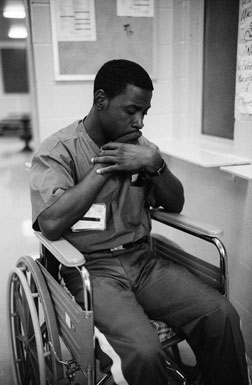
Next week, the Supreme Court will hear a case testing whether the Eighth Amendment's ban on cruel and unusual punishment prohibits sentencing a teen to life in prison without parole. Punishment is generally deemed "cruel" if it's more than "graduated and proportional." It is constitutionally "unusual" if imposed so infrequently "that a national consensus has developed against it." If those concepts sound squishy and vague to you, well, you can just imagine what Antonin Scalia is feeling right now.
The seeds for this particular constitutional battle were sown in Justice Anthony Kennedy's majority opinion in a 2005 case, Roper v. Simmons, banning capital punishment for juveniles. That case hinged on the growing national consensus against executing teens, bolstered by scientific studies finding teenage brains to be underdeveloped in ways that make their owners less culpable than adults. The question for the court this time around is not just whether teens are really different from adults but whether being sentenced to die in prison is truly all that different from being sentenced to die there by lethal injection.
Read on...

No comments:
Post a Comment